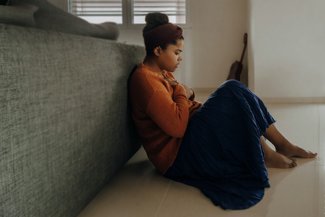
Underexamined and Underreported
Agenda Alliance's briefing on the links between intimate partner violence, suicidality (suicide attempts and suicidal thoughts), and self-harm.

22 Feb 2023
Agenda Alliance has today (22 February 2023) published rare, much needed data in a new briefing paper, Underexamined and Underreported, which found that:
Today’s findings uncovered by Agenda Alliance have led to fresh calls for midwives, dentists, probation, Jobcentres and all professionals across healthcare, justice, education and welfare sectors to be trained to better understand and respond to women at risk of both domestic abuse from their partner and of suicidal thoughts and suicide attempts.
Why underexamined and underreported? Historically, the focus in suicide prevention has been on men due to their longstanding higher suicide rate. However, this has led to a worrying lack of understanding of the growing rate of attempted suicide and self-harm among women and any link with domestic abuse. Today’s new figures begin to fill in the missing link. The analysis has been carried out by academics from the VISION Consortium at City, University of London, based on questions about suicidal thoughts, suicide attempts and non-suicidal self-harm and on the most recent Adult Psychiatric Morbidity Survey (APMS).
Following the new analysis Agenda Alliance demands:
Women experiencing abuse from a partner, experiencing suicidal thoughts and attempts, often feel alone, as if there is no way out.
Sara, one of the women we spoke to, said:
"My partner was hitting and abusing me. He used to chase me with knives. It was terrible. I tried to take my own life on a couple of occasions. We were in a hostel at the time so I couldn’t really confide in anybody. It was an awful situation and I didn’t think I could get out of it. My family had totally disowned me, I had no friends, nobody."
The women we spoke to expressed deep distrust towards professionals, emphasising the importance of training and understanding around self-harm, suicidal thoughts and domestic abuse.
Kerbie said:
"It’s more trouble going to the professionals asking for help than being in the situation. I don’t trust social services because of the way they’ve treated me. Still to this day, I don’t trust them. Instead of helping me through the domestic violence, they took my kids. They blamed the violence on my choice of men. That worsened my mental health, the fact that they took my kids instead of looking at the bigger picture and trying to help me through it."
Jess Southgate, Deputy CEO of Agenda Alliance:
"It is shameful that the clear link between domestic abuse and suicidal feelings amongst women has not previously been recognised as the public health crisis that it is. We at Agenda Alliance know that the most marginalised women are often those most at risk. Yet time and again their needs and experiences are overlooked. In the ongoing cost-of-living crisis it is essential that women are not left trapped in abusive situations. All public service professionals must be trained to ask if women are safe, and to support them to get the help they need. With a new Suicide Prevention Strategy promised this year, now is the time to demand appropriate action, training and support."
Sally McManus, Senior Lecturer in Health at the Violence and Society Centre based at City, University of London:
"This new analysis casts light on a crucial but neglected topic, showing that when a woman presents to services in suicidal distress it is likely that she's a victim of domestic abuse. That likelihood rises for people living in poverty, especially those who are unemployed or disabled. Professionals working in Jobcentres, housing associations and other welfare services have frequent contact with women facing financial stress and debt. It’s vital that welfare professionals, as well as those working in health and social care, recognise the very high rates of domestic abuse experienced by such women, and are aware of the extent to which their distress can manifest in self-harm and suicidality. They should be trained to ask people if they are safe and supported to act accordingly."